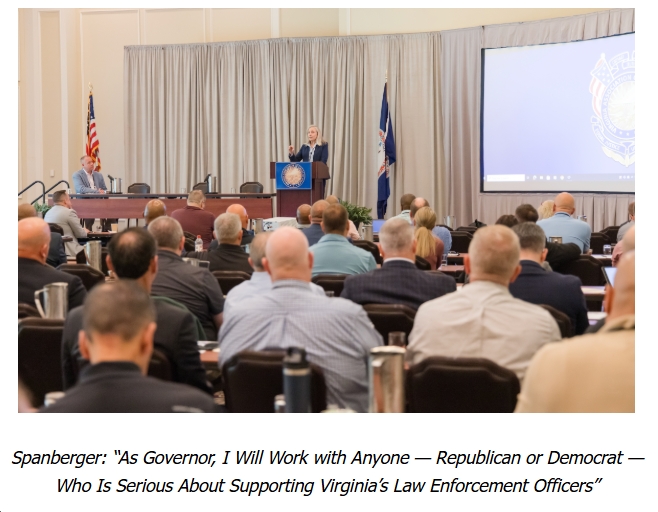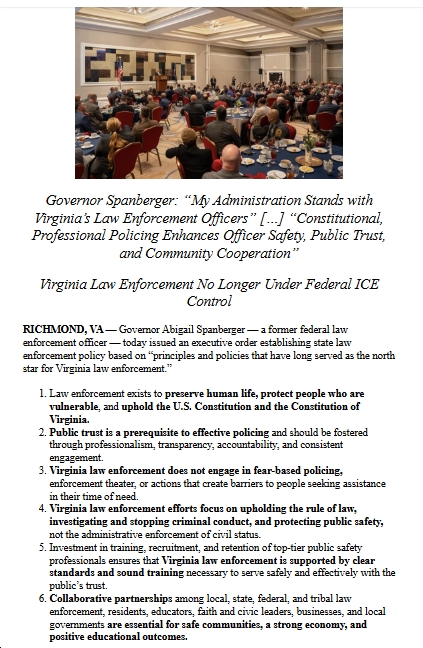From Gov. McAuliffe’s office as the final hours of his term tick down…
Governor McAuliffe Grants Conditional Pardons to Six Virginians Serving Unjust Sentences
RICHMOND – Governor Terry McAuliffe today signed conditional pardons for 6 Virginians who were given sentences that were excessive and unjust in relation to the crimes for which they were convicted.
“Virginia’s first responsibility to its citizens is to keep their families and communities safe,” said Governor McAuliffe. “As we uphold that responsibility, we must continuously strive to ensure that the punishments offenders receive are commensurate with the crime they committed. Each of these Virginians, some of whom committed their offense as juveniles, was convicted for a serious crime that should have resulted in their incarceration and rehabilitation. However, the sentence that they received was far outside what should have been adequate to keep Virginia safe.
“I am proud that each of these Virginians will serve an appropriate term and get a second chance at a more productive life. Going forward, I hope the General Assembly will consider the outrageous sentences in these cases and take appropriate steps to better balance safety and justice in the application of our laws.”
Governor McAuliffe issued pardons to the following individuals:
Travis Hassan May – Travis May was sentenced to 160 years in prison for a string of armed robberies in which no one was injured and that occurred when he was only 16 years old. He has served over twenty years in prison. Sentencing juveniles to life sentences without the possibility of parole has been ruled unconstitutional by the U.S. Supreme Court and yet Mr. May was ineligible for parole due to Virginia’s three-strikes laws, even though his sentence was, in effect, life. While in prison, Mr. May has had a sterling record, completed numerous educational and rehabilitation courses, and won the support of numerous individuals. It is Mr. May’s great reform and rehabilitation that underscores the inherent injustice in sentencing juveniles to life sentences.
The Governor has pardoned Mr. May on the condition that he complete the Department of Corrections re-entry program prior to release and enter a three-year period of supervised release.
Travion Blount – Travion Blount was 15-years old when he, together with two older men, held up a house party in which no one was seriously injured. He was offered a plea deal for 14-years incarceration, but wanted to proceed to a jury trial. He was convicted and given numerous life sentences plus 118-years incarceration. Governor McDonnell reduced his sentence to 40 years, which effectively destroyed Mr. Blount’s legal case that his conviction violated the constitutional prohibition on sentencing juveniles to life without parole. One of Mr. Blount’s co-defendants is already released and the other is expected to be released in 2018.
The Governor issued a partial pardon further reducing Mr. Blount’s sentence to 14 years, the amount of his original plea offer. This is conditioned on meeting good behavior conditions set by the Virginia Parole Board, successfully completing the re-entry program, and entering a three-year period of supervised release.
Messiah Johnson – Messiah Johnson was sentenced to 132 years in prison for a single armed robbery in which no one was injured. Mr. Johnson has served over twenty years for this crime and yet there are serious questions about his guilt – he has always maintained his innocence and there is credible evidence that he was not guilty at all. However, the investigation into his absolute pardon petition has not yet been completed. Messiah Johnson was also sentenced by a jury that was not informed that parole had been abolished in Virginia.
The Governor has pardoned Mr. Johnson on the condition that he complete the Department of Corrections re-entry program prior to release and enter a three-year period of supervised release. The pardon is issued without prejudice to his absolute pardon petition or other judicial remedies.
Leonard Lenon Singleton – After serving his country in the United States Navy, Leonard “Lenny” Singleton became addicted to drugs and spiraled into a pattern of criminal behavior in which he robbed a number of individuals over the better part of a year. No serious injuries occurred and yet he was sentenced to two life sentences plus 110 years. Lenny Singleton has taken great advantage of the Department of Corrections programs for education and rehabilitation and has been a model inmate for over a decade.
The Governor has pardoned Mr. Singleton on the condition that he complete the Department of Corrections re-entry program prior to release and enter a three-year period of supervised release.
Adrian Earl Davis – Adrian Davis was sentenced to 38 years in prison for a series of robberies that occurred over a short period. The judge sentenced him because, at the time, he believed the mandatory minimum sentences had to be run consecutively and not concurrently, which has been changed by a subsequent decision of the Virginia Supreme Court. Mr. Davis has significantly rehabilitated himself and been a model inmate.
The Governor has pardoned Mr. Davis on the condition that he complete the Department of Corrections re-entry program prior to release and enter a three-year period of supervised release.
Tawana Simmons Terry – Tawana Terry was sentenced to 30 years in prison for distributing $80 worth of crack cocaine. She has been a model inmate during her almost decade-long incarceration, completing numerous educational and rehabilitation programs. She is the mother of three children with whom she will be reunited after release.
The Governor has pardoned Ms. Terry on the condition that she complete the Department of Corrections re-entry program prior to release and enter a three-year period of supervised release.
To view the full order for each of these conditional pardons, click here.

















